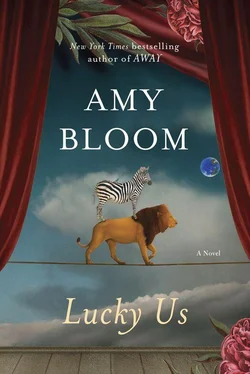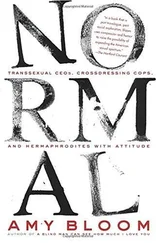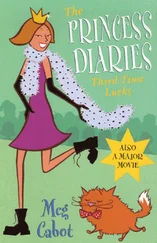I was sixteen and I was used to Iris and Reenie, and used to the happy Torellis and now used to my father pretending to be a butler, although watching him bow his head, just an inch, when Mr. Torelli told him to pull the car around, bothered me. Clara Williams was extraordinary to me. I was embarrassed to be so fascinated by her odd, smooth skin and her cool manners and to be so enamored of her voice. My lucky father.

WE WERE ALL BROKE, but I was more so. I took money, very carefully, from everyone’s open purse or wallet. Reenie kept a couple of quarters in her old black coin purse and Iris always had loose change now, now that she was back in business. She was Irish Maid, Second Debutante, Silly Shopgirl, appearing nightly near or on Broadway. Iris was working hard, and not just onstage. She told me about the agents she had to woo, and the stage managers. She told me it was important to pay for your own drink when the cast went out after the show and she told me that putting an extra dollar in the pot made people like you more. She did her exercises every day, she said, and she was taking dance and she’d gotten into an acting class. She said her voice was an instrument and her body was an instrument. And my ass is a Stradivarius, she said.
I JUST WANTED TO begin my own life, one that didn’t include my relatives. I showed up at Bea and Carnie’s in time for lunch, most days. They were interested in Clara too. Was she really Negro, what did she use on her skin, what kind of singer was she, would she ever let a white person do her hair? I loved that Bea and Carnie thought that Clara and I sat around, chewing the fat at our kitchen table. Francisco didn’t have time for me. He had a skinny boy with Frank Sinatra hair sweeping up and shampooing at his shop and he had two barbers working for him. He didn’t need me, he said. He said that as much as he loved me, I’d be better off working for his sisters. He trimmed my bangs and the skinny boy watched us and swept up the tiny snips of hair with a big flourish. I went back to La Bella Donna.
Bea and Carnie said I’d done so well at the shop, I should come with them on house calls and pick up some more pin money. You’re not a baby, Bea said. Start planning ahead. House calls meant more and more careful sweeping up than at the shop. I did notice that the ladies were very happy for me to use the lint brush on their furniture, make tea, and empty the trash, and would you mind, there’s a good girl, just take the dog for walkies while I’m drying. I took small things that I thought would not be missed. The house-call ladies were rich but not Torelli rich. Cigarette lighters would be missed. Brooches would be missed. I took a can of peanuts, a pair of navy kneesocks. I found five dollars in a man’s raincoat pocket and took it. I thought, I’m planning ahead.
Bea and Carnie spent weeks talking about whether or not to take me to Mrs. Vandor’s. Mrs. Vandor was their prize. Her first husband had been a Hungarian nobleman (Bea said) and he died in World War I (or in France, in a car accident, Carnie said). Mrs. Vandor had escaped Hungary and come to this country (with just the clothes on her back, Bea said, or with gold coins sewn into her underwear, Carnie said) and married a White Russian who died of TB. Now she had a beautiful apartment in the nicest building in East Brooklyn and she was their favorite client, ever.
I’d become a good assistant. I thought this was not surprising but Carnie said just the opposite was true. You don’t see yourself in ten years, still sweeping up piles of hair and drying the sink with a rag and scrubbing the hair color off someone’s face so they don’t look spotty, do you? You don’t think you’ll be doing this forever, do you? I said that I didn’t. (My vision of the future was like the paintings I’d seen of the Old West, mysterious, serious, with great beauty at every vista and terrible things happening whenever any people appeared.) There you go, Carnie said. I’m saying, the best kind of assistant is Dora’s girl, Kimmy, who wants to be an assistant. Wants to. You see how happy she is when she gets every hair off the floor? I did. I swept for praise, for Francisco’s hooded look of approval when he dropped by, for lunch and a dollar and a place at the table. I did not sweep for the pleasure of a job well done.
Kimmy was our mascot. She had a lazy eye and she was a little slow. I never saw anyone be unkind to her. When Kimmy was in the shop, Carnie made a point of saying good things about the nuns, about convents, and how much fun the sisters had. Bea said that a nunnery sounded like a great place to live. In the end, even with the lazy eye, Kimmy married well, a much older man, with his own business and no children, and they moved to Astoria. When her mother got heart trouble, she moved in with Kimmy and her husband and Carnie said to me, See? No one knows anything.
They were not bringing the likes of Kimmy to Mrs. Vandor’s. Neither of them wanted to do the cleanup. They liked spending the afternoon with Mrs. Vandor. I think she was the only woman they considered more worldly, more truly cosmopolitan than they were. They looked at the newspaper pictures of socialites and their Greek playboys, of women in tiaras in front of summer houses in Italy and estates in Rhode Island, of men with three last names resting their hands on their horses and sports cars and I never heard a bitter, envious word from them. They mused about famous people’s errors in judgment, the same way they did about their neighbors, about my family and theirs. They frequently said, as I do now, Too bad money and taste don’t live together. They said, as I could say every day of my adult life, God doesn’t give with both hands, honey.
Mrs. Vandor’s apartment was to all the homes I’d seen, as Jackie Kennedy would be to all the previous first ladies. It was fresh and chic but soft and so assured that as soon as you walked in, you understood that not only did you live with the wrong furnishings, in whatever unfortunate place you came from, you also had chosen the exact wrong outfit just that morning. You would have had a very hard time persuading me that Mrs. Vandor was not an exceptionally lovely human being, even if she’d walked in dragging a bleeding body and proceeded to kick the living Jesus out of it. Which she didn’t. She was tall, fair, and regal, rather than thin (if I hadn’t been star struck, I would have said that she looked like a very pale camel), wearing long gray silk pajamas, the top unbuttoned over a long white satin shirt. (Which I couldn’t get over — I thought about it for days. Was it underwear, even though it was satin, where else did she wear it, was it something that she wore only at home, the way my mother had, on some Sunday mornings, worn a cotton housedress while she got ready for my father?)
Bea and Carnie introduced me as their niece and Mrs. Vandor said, Don’t be ridiculous — she’s not a relative of yours. Some Scotch-Irish and Russian mix. Bea and Carnie looked at me and I shrugged. Mrs. Vandor made us all tea poured into cups I was afraid to hold and afraid to sip from. I tried to keep my lips over my teeth, so that I wouldn’t bite the china by accident. Carnie looked at me hard. I put down my cup, rattling it in the saucer, and I held on to a ginger cookie (with lemon cream filling) like it was a life preserver.
Carnie colored Mrs. Vandor’s gray hair ash-blond and then Bea did her hands and feet. Mrs. Vandor closed her eyes until they were finished. I offered to wash the cups and empty the wastebasket and Mrs. Vandor said, with her eyes closed, I wouldn’t make that kind of thing a habit. One wishes to be useful, but not indispensably so. She gave me two dollars and a Bonwit’s bag with books in it.
Читать дальше













